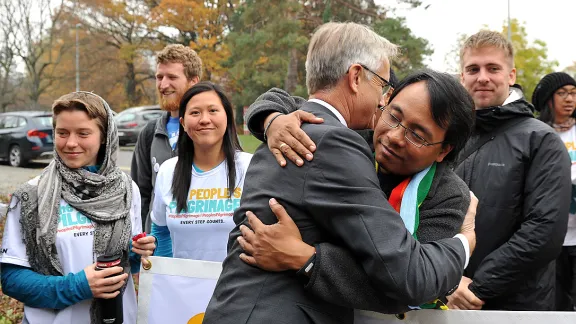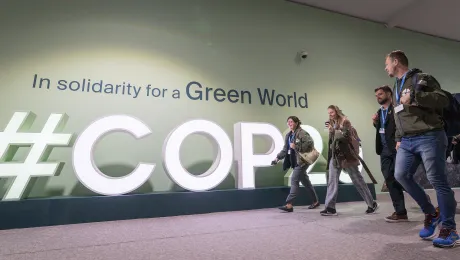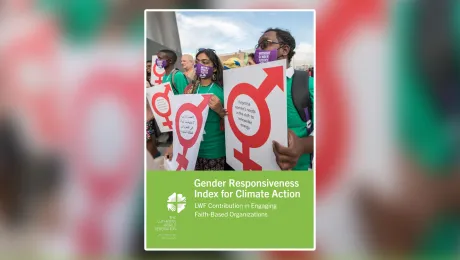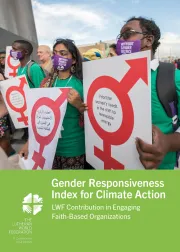
LWF general secretary Rev. Dr Martin Junge greets climate campaigner Yeb Saño as Saño and 17 other pilgrims arrive in Geneva on a march from Rome to Paris to push for a new climate deal. Photo: LWF/S. Gallay
A message from the People’s Pilgrimage in Geneva
(LWI) – After crossing the lower alpine region of Italy into Switzerland, a group of pilgrims arrived at Geneva’s Ecumenical Center with the message that international climate change talks that begin in Paris in just over three weeks must end with a new climate agreement.
Leading the People's Pilgrimage is Yeb Saño, a former vice-minister and chief climate negotiator for the Philippines at the United Nations’ climate body, the United Nations Framework Convention on Climate Change. His emotional plea two years ago at UN climate talks in Warsaw in the wake of typhoon Haiyan inspired the global campaign, Fast for the Climate.
The 18 pilgrims are walking the 1,500km from Rome to Paris, one of dozens of pilgrims taking place globally. Most on the Rome-Geneva leg are from the Philippines but also include the United Kingdom, France, Italy, the United States and Hong Kong.
At the Conference of Parties in Paris (COP21), which opens on 30 November, nearly 200 member countries of the UN Framework Convention on Climate Change have to reach a universal, legally-binding agreement to limit global warming to below 2°C.
Speaking at the Ecumenical Center, Saño said Paris was not the final destination but rather one stop on a longer journey for which the ultimate destination is the hearts and minds of people around the world.
“Climate change has always been discussed in an economic, scientific and political context. I’m encouraged that faith communities have started to strongly stand up on this issue. It has become a unifying thread for all of us. Climate change is a spiritual crisis. It is a moral issue. It is a moral controversy.”
It was such an important issue it could not be confronted merely with technical or scientific solutions. “We have a problem in our soil, water and air but the biggest problem is in our hearts. Unless we confront this, climate change cannot go away.”
A matter of life and death
Saño referred to his brother, Amado Saño, a fellow pilgrim, who survived typhoon Haiyan when it ripped through the Filipino city of Tacloban almost two years ago. “He stood at the heart of the devastation and for many days he picked up bodies of the dead. He counted 78 dead bodies in his own hands. That is an experience that will never go away. No one is prepared to do that, not even the best rescuers in the world. They are not trained to face such a tragic experience. Climate change is a matter of life and death and survival for many people around the world.”
COP21 meant the world had failed been failing for 20 years. “I don’t want to arrive at COP30 and find climate change is still not resolved,” he said.
“As the defining issue of our generation, we will be judged by future generations on how we respond to this crisis. We will be measured by our failure or we will be applauded for this triumph over crisis.”
The People’s Pilgrimage was an “amazing journey”, with each of the 36 days bringing forth something beautiful. “The lesson we have learned is that there is hope for humanity when people host us, welcome us, and teach us faith in each other. That is all we need to take every step forward.”
“We call it a pilgrimage, not a regular walk or journey. It is not just physical and mental, it is largely spiritual,” Saño said.
Guillermo Kerber-Mas, of the World Council of Churches, said the People’s Pilgrimage was one of the most interesting climate initiatives, showing how people are concerned about the climate. In the nine COP sessions he had attended, he saw how complex it was just to respond to the basic moral climate crisis.
Martin Kopp, LWF advocacy officer for climate justice, used the analogy of contributions that each nation must make to confront climate change, saying that faith-based organizations could bring spiritual contributions. “We have contemplation, prayer, pilgrimage, fasting. These are our spiritually-determined contributions.”
He said the Fast for the Climate campaign, which grew out of the COP19 meeting in Warsaw, was “way broader” than only people of faith, with agnostics and atheists among its supporters. People in over 90 countries support the initiative. Since COP20 in Lima last year, people are fasting across the globe until Paris, celebrating the “joy that comes out of fasting together, envisioning a world more just, peaceful and sustainable.”
He added, “The climate challenge will not disappear in December even if we’re successful at COP21. Whatever happens, we are here to build a social movement for climate justice.”
ACT Alliance’s Vitumbiko Chinoko emphasized the role of faith communities in what he described as a game of power. “No matter how much scientific evidence is presented, we see big powers getting away with it,” he said.
“Whatever happens in Paris we still need to get governments to agree to do what they have agreed. Adaptation, finance and review issues can be agreed. If we achieve those elements, we can actually say we’ve achieved something out of Paris,” Chinoko sadded.
People’s Pilgrimage event page


